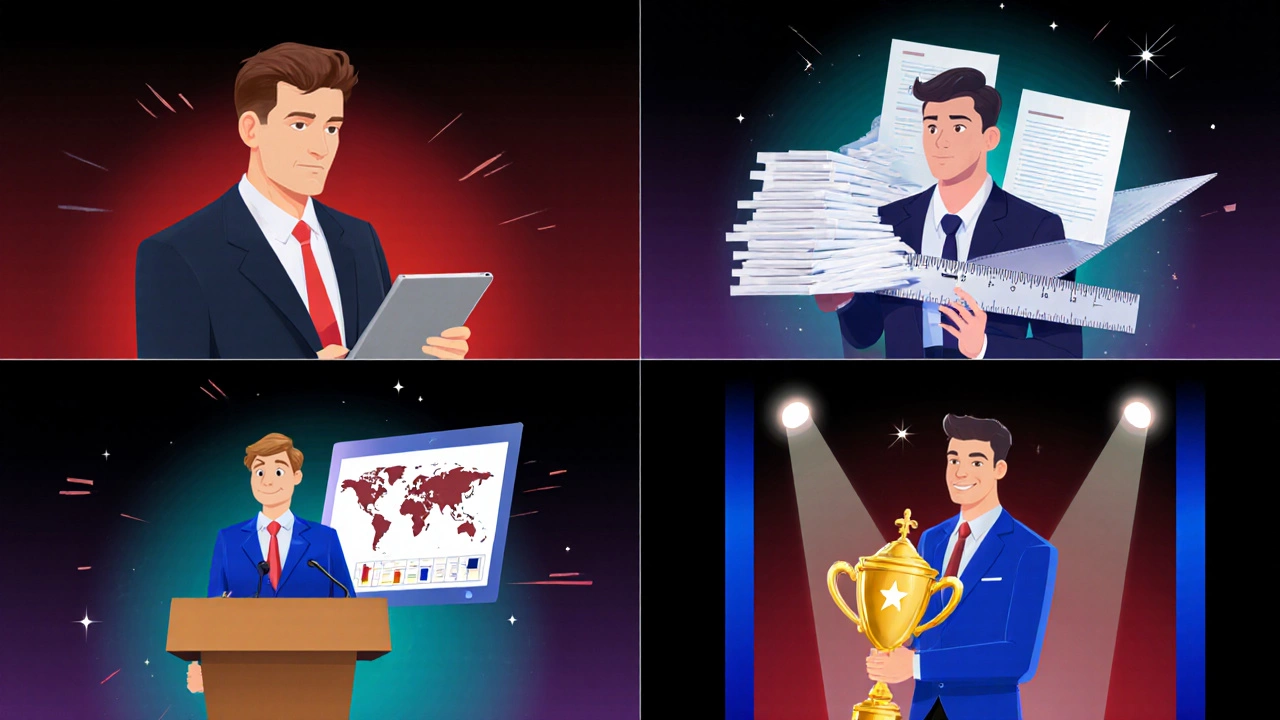Competitive Personality Assessment Quiz
How Competitive Are You?
Take this 5-question quiz to discover your competitive personality profile and learn how to harness your drive constructively.
Ever wondered why some people seem to thrive on beating the odds while others just go with the flow? The answer lies in the mix of traits that push a person toward a win‑or‑lose mindset. Below we break down the personality styles most linked to a fierce competitive spirit, show how they differ, and give you a roadmap to channel that drive without burning out.
Key Takeaways
- TypeA, ENTJ, and Enneagram3 are the top contenders for the most competitive personalities.
- Within the Big Five, high Conscientiousness and low Agreeableness predict a stronger urge to compete.
- Dark‑Triad traits add an edge, but they can also lead to toxic outcomes.
- Knowing your own profile helps you harness competition healthily and avoid common pitfalls.
- Practical tips at the end show how to boost constructive competitiveness in any setting.
What "competitive spirit" Really Means
Competitive spirit is a psychological drive that motivates individuals to outperform others, chase rankings, and seek victory in tasks ranging from sports to corporate projects. It’s not just about winning; it’s about the inner fire that fuels effort, persistence, and risk‑taking.
Personality Models that Capture Competition
We’ll look at four popular frameworks. Each offers a lens on why some folks chase every leaderboard while others are content staying in the background.
1. TypeA Personality
TypeA personality is characterized by high achievement orientation, impatience, and a constant sense of time pressure. Researchers have linked TypeA to greater stress hormones and a relentless push for success.
- Key traits: ambition, time urgency, competitiveness.
- Typical settings: sales floors, startup founders, elite athletes.
2. Big Five - Conscientiousness + Low Agreeableness
The Big Five breaks personality into five broad domains. Two of them matter most for competition:
- Conscientiousness: orderliness, self‑discipline, and goal‑directed behavior.
- Low Agreeableness: less concern for harmony, more focus on personal gain.
Studies from the International Personality Item Pool (IPIP) show that people scoring high on Conscientiousness and low on Agreeableness outperform peers in competitive environments like finance and law.
3. Myers‑Briggs - ENTJ (The Commander)
ENTJ is described as strategic, decisive, and naturally inclined to lead teams toward measurable results. Their extraverted thinking function makes them enjoy challenges that test skill and authority.
- Typical arenas: corporate leadership, political campaigning, competitive gaming.
- Why they win: forward‑looking planning, ruthless efficiency, love for benchmarks.
4. Enneagram - Type3 (The Achiever)
Enneagram Type3 centers on image, success, and the desire to be seen as the best. Type3s are adept at self‑promotion and constantly set higher goals.
- Strengths: charisma, goal‑setting, adaptability.
- Risk: over‑identifying self‑worth with external accolades.
How Dark‑Triad Traits Influence Competition
When you add a dash of the Dark Triad-Machiavellianism, Narcissism, and Psychopathy-you get a competitive edge that can turn ruthless.
- Machiavellianism: strategic manipulation to outmaneuver opponents.
- Narcissism: craving admiration fuels relentless self‑improvement.
- Psychopathy: low fear of failure encourages high‑risk bets.
While these traits can boost short‑term wins, they often erode trust and long‑term sustainability. Knowing where you stand on this spectrum helps you keep ambition in check.

Comparison of Personality Types and Their Competitive Scores
| Framework | High‑Competition Indicator | Typical Score (0‑10) | Strengths | Potential Pitfalls |
|---|---|---|---|---|
| TypeA | Time urgency & achievement focus | 8 | Speed, goal‑orientation | Stress, burnout |
| Big Five (Consc.+Low Agree.) | Self‑discipline & low cooperation | 7 | Reliability, perseverance | Interpersonal friction |
| ENTJ (MBTI) | Strategic leadership | 9 | Vision, decisive action | Domineering attitude |
| Enneagram3 | Success‑driven image | 8 | Charisma, adaptability | Over‑identification with outcomes |
| Dark‑Triad (Machiav.) | Manipulative tactics | 6 | Strategic cunning | Trust erosion |
Identifying Your Own Competitive Profile
- Take a short Big Five test (many free versions online). Note your Conscientiousness and Agreeableness scores.
- Answer a few MBTI questions focusing on thinking vs. feeling and judging vs. perceiving. If ENTJ pops up, you’re likely wired for strategic competition.
- Reflect on stress patterns. Frequent time pressure and a “don’t waste a minute” mindset point to TypeA.
- Ask yourself: Do I chase praise (Enneagram3) or prefer silent mastery (might be a high‑Conscientious Introvert)?
- Check Dark‑Triad tendencies with a brief questionnaire; high scores signal a need for ethical guardrails.
Mapping these results gives you a clear picture of where your competitive engine runs hot and where it might sputter.
Channeling Competition Constructively
Even the most cut‑throat types can learn to flex their drive toward positive outcomes.
- Set personal milestones instead of constantly comparing to others. This shifts focus from external validation to intrinsic progress.
- Practice reflective debriefs after each win or loss. Ask: What skill improved? What could I do better next time?
- Pair with a collaborative partner who balances your high aggression with empathy. This reduces conflict and builds trust.
- Use gamified dashboards to visualize progress. Seeing data turn into points satisfies the competitive urge without harming relationships.
- Schedule regular recovery - meditation, walks, or hobbies unrelated to performance. This keeps cortisol in check for TypeA and high‑Conscientious folks.
When Competition Turns Toxic
Red flags appear when the desire to win overshadows ethics or wellbeing.
- Cutting corners to meet a target.
- Sabotaging teammates to stay ahead.
- Feeling empty after a victory because the win didn’t bring lasting satisfaction.
If you notice these patterns, consider adjusting your goal orientation toward mastery (learning) rather than performance (outperforming others).

Future Trends: Competitive Traits in AI‑Driven Workplaces
Automation is reshaping what competition looks like. As routine tasks disappear, the premium shifts to creative problem‑solving and strategic foresight-areas where ENTJ and high‑Conscientious types excel.
Meanwhile, organizations are rewarding collaborative innovation more than pure individual ranking. Expect hybrid metrics that blend personal KPIs with team impact scores.
Quick FAQ
Frequently Asked Questions
Which personality type is the most competitive?
Research consistently points to a blend of high Conscientiousness, low Agreeableness, and a TypeA mindset. In MBTI terms, ENTJ scores highest, while Enneagram3 follows closely.
Can I become more competitive if my profile is low on those traits?
Yes. Targeted habits-like setting incremental challenges, tracking performance, and practicing strategic thinking-can boost competitive drive without altering core temperament.
How do Dark‑Triad traits affect competition?
They add a ruthless edge that can win short‑term battles but often damage relationships and long‑term credibility. Balance is key.
What practical steps help me use my competitive spirit healthily?
Focus on personal milestones, debrief after each outcome, pair with a collaborative buddy, use gamified tracking, and schedule recovery time.
Will AI change what personality traits are valued?
AI automates routine work, pushing value toward creative strategy, adaptability, and ethical judgment-areas where high‑Conscientious and strategic types thrive.
Take the Next Step
Now that you know which personalities carry the strongest competitive fire, pick one of the quick self‑assessments listed earlier. Identify gaps, set a modest challenge this week, and track how you feel. Notice the difference between winning for ego and winning for growth-that’s where the real power of a competitive spirit lies.
